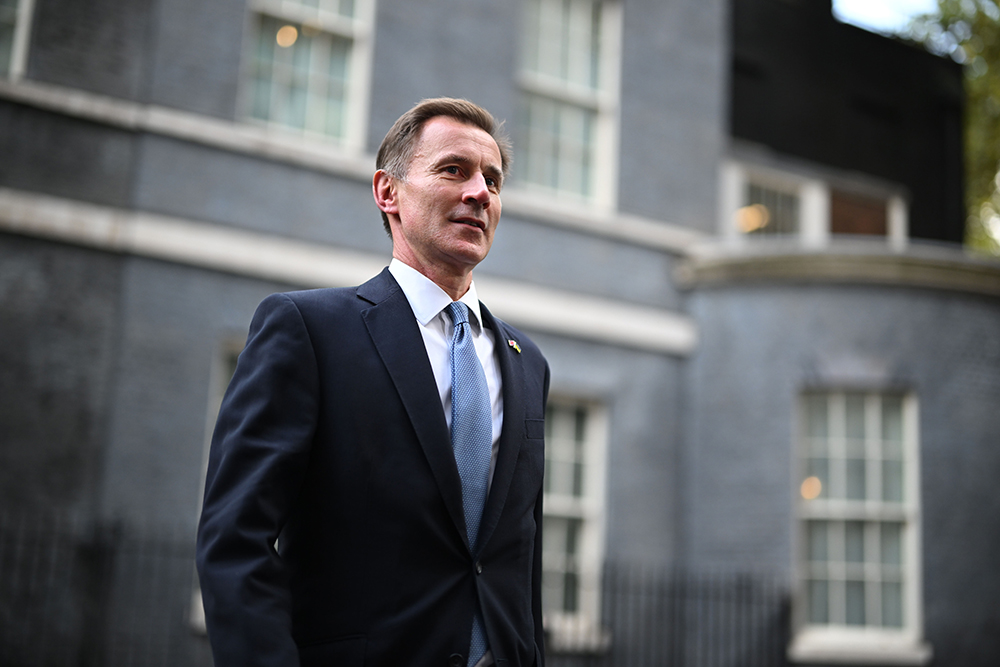James Heale has narrated this article for you to listen to.
‘I didn’t come into politics to raise taxes on working people,’ said the shadow chancellor Rachel Reeves in Liverpool this week. ‘Indeed I want them to be lower.’ That was a direct electoral attack on Reeves’s opposite number, Jeremy Hunt, who has increased the already huge fiscal burden on the British public. If the Tories aren’t the party of lower taxes, what are they for?
The challenge for the Treasury whips is how to stop tensions in the tearooms over tax from spilling out into the open
Hunt’s more immediate challenge comes from a tax rebellion within his own ranks. His Tory colleague Sir Jake Berry – the pugnacious leader of the Northern Research Group – has corralled a phalanx of fellow MPs into endorsing a pledge to not vote for any new taxes that increase the overall burden. ‘The future belongs to us,’ boasted Sir John Hayes, 65, at the New Conservatives’ conference rally which launched the scheme.
Inspired by the American activist Grover Norquist, Berry’s pledge aims to be a ‘marker in the sand’ and a way to ‘change the culture of constant tax rises’, according to one involved. By the time of the next general election, taxes are expected to comprise around 37 per cent of national income; no modern parliament has ever seen a bigger increase in taxes. According to the TaxPayers’ Alliance, in 2010-11, Labour’s expenditure was 45.7 per cent of GDP, while last fiscal year it was 45.6 per cent. Remove the credit crunch and Labour spent an average of 37.6 per cent of GDP every year in office, compared with 41.5 per cent under the Tories pre-Covid. That increase has been covered in large part by tax rises and fiscal drag, as tax thresholds have failed to keep up with inflation and wage growth. The Conservatives are proud of taking many low-paid workers out of tax, yet this year’s tax burden is the highest since 1949.

Unveiling his scheme, Berry coolly told reporters that he wouldn’t expect MPs to have the whip removed for voting against tax rises – ‘not least because 33 of us have signed already’. Names were collected covertly to avoid alerting the party whips: the thinking being, in the words of one organiser, ‘They can’t take it away off all of us.’
The likes of Liz Truss, Priti Patel and Iain Duncan Smith are among the pledge’s advocates: Lord Frost is the latest recruit, and further names will be unveiled in the coming weeks. Parliamentary candidates are urged to sign it too, with those who swear allegiance rewarded with social media-friendly graphics boasting ‘I signed the tax pledge.’
Berry’s pledge is a warning shot in the battles that are set to dominate the remaining 15 months of this parliament. With the party conferences over, Labour retains its 20-point poll lead. Tory hopes now rest on the King’s speech, the autumn statement and thereafter a probable spring Budget. A light legislative agenda is anticipated to maintain the focus on Rishi Sunak’s five priorities and minimise Labour’s chances for additional amendments. The focus of most Tory internal discontent therefore is likely to be directed at the Chancellor, who will find himself once again under pressure to cut taxes.
Hunt is outwardly determined to resist such calls – at least until the economic conditions improve. He prefers to focus on the problems of business investment and productivity, alongside efforts to get thousands off out-of-work benefits. The deterioration of credit markets in 2022 and 2023 has shifted the debate on deficits and on both spending and taxation. Markets became more cautious about lending to governments than they have been since the financial crash of 2008, and interest rates have risen dramatically.
Hunt fears that tax cuts risk fuelling the inflation that remains three times higher than the Bank of England’s target. ‘Any benefit would be wiped out instantly,’ argues one ally. It’s an argument that Hunt expects to have at length with parliamentary colleagues across different regions, factions and caucuses over the next five weeks. His inflation priority is shared by his next-door neighbour. So in lockstep are Hunt and Sunak that they have been dubbed by some in the Treasury ‘Chancellor One’ and ‘Chancellor Two’.
The challenge for the Treasury whips is how to stop tensions in the tearooms over tax from spilling out into the open. Earlier this year, some MPs on the Tory right mulled voting against the global minimum corporation tax in the Finance Bill. This was avoided, but Berry’s tax pledge could raise such questions again if the burden of taxation rises in the final Budget of this parliament.
Among those agitating for a reduction in the tax burden, there are splits as to how to achieve it. Take the free-market Conservative Growth Group, whose ranks have swelled to some 60 MPs: its leaders, Ranil Jayawardena and Simon Clarke, were staunch Trussites but are divided on abolishing inheritance tax. Jayawardena views the ‘death tax’ as ‘anti-family’ but Clarke would prefer to cut taxes on personal income.
There’s a levelling-up angle to all this: Jayawardena sits for leafy North East Hampshire, where many families are affected by the inflated property prices of south-east England. But Clarke represents Red Wall Middlesbrough, where far fewer households reach the £325,000 threshold for inheritance tax. The debate exists within government too: Michael Gove has flirted with the merits of a wealth tax to reduce the burden on working people. Should Hunt decide to cut taxes, his choice of priorities will give a glimpse into the balance of power within the party.
Tax is a topic some Tory MPs are happy to spend much time debating; spending cuts are another matter. One MP from the 2019 intake, now a minister, points to the manifesto they were elected on: ‘That was all about expanding the state: more doctors, more nurses, more police officers, and it was incredibly popular. There is no public mandate to slash public services.’ This is the conversation the Tory party ducked last summer: how do you cut tax while maintaining spending levels? A veteran of the 2010 intake contrasts the political climate now with that of the coalition era. ‘Back then you had ambitious MPs making the case for cuts, day in, day out. Who wants to argue for austerity now?’
On tax and spend, the challenge for the Tories remains the same as it was 13 years ago: exactly how big should the British state be? The future of the party is likely to belong to whoever can convincingly articulate an answer to that question.







Comments